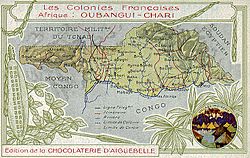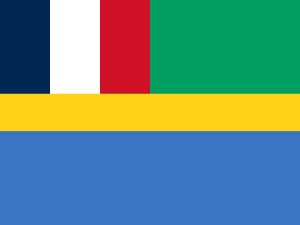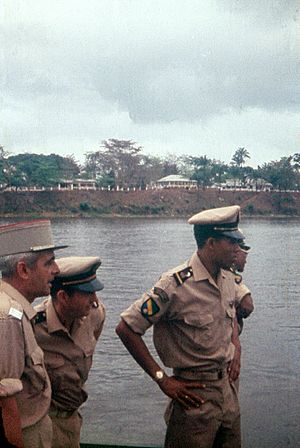Léon M'ba facts for kids
Quick facts for kids
Léon M'ba
|
|
|---|---|
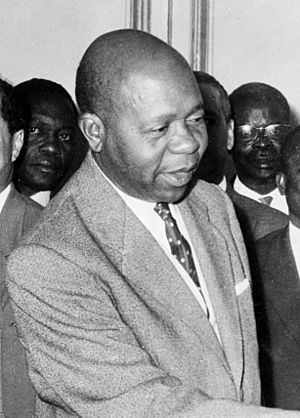
Léon M'ba in 1964
|
|
| 1st President of Gabon | |
| In office 12 February 1961 – 28 November 1967 |
|
| Vice President | Paul-Marie Yembit Albert-Bernard Bongo |
| Preceded by | Position established |
| Succeeded by | Omar Bongo |
| 1st Prime Minister of Gabon | |
| In office 21 May 1957 – 21 February 1961 |
|
| Preceded by | Position established |
| Succeeded by | Léon Mébiame (as Prime Minister in 1975) |
| Personal details | |
| Born |
Gabriel Léon M'ba
9 February 1902 Libreville, French Congo (now Gabon) |
| Died | 28 November 1967 (aged 65) Paris, France |
| Nationality | Gabonese |
| Political party | Comité Mixte Gabonais, Bloc Démocratique Gabonais |
| Spouse | Pauline M'ba |
Gabriel Léon M'ba (born February 9, 1902 – died November 28, 1967) was a very important politician from Gabon. He was the first Prime Minister from 1959 to 1961. Then, he became the first President of Gabon, serving from 1961 until 1967. He played a key role in helping Gabon become an independent country.
Léon M'ba was part of the Fang ethnic group. He grew up in a well-known family in his village. After studying at a special school called a seminary, he worked different jobs. He then joined the French colonial government as a customs agent. He was very active in supporting black Gabonese people, which sometimes caused problems with the French rulers. He was sent to prison for a short time for a minor offense. Later, he was chosen to lead a local area in Estuaire Province. He faced some challenges and was sent away from Gabon for a period. During this time, he wrote important works about the traditions and laws of the Fang people. He was praised for his work by local leaders. In 1946, the French government finally allowed him to return to Gabon.
After returning, he quickly rose in politics. He became Prime Minister on May 21, 1957. He worked to make Gabon more connected with the French-African community. Gabon gained its independence from France on August 17, 1960, and M'ba became its first president. In February 1964, there was a brief attempt to remove him from power, but France helped him return to his position. He was re-elected in March 1967. Sadly, he passed away from cancer in November 1967. His vice president, Albert-Bernard Bongo, took over as president.
Contents
Early Life and Education
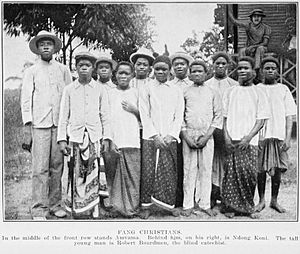
Léon M'ba was born on February 9, 1902, in Libreville, which is now the capital of Gabon. He belonged to the Fang ethnic group. His father was a village chief and managed a small business. His mother, Louise Bendome, was a seamstress. Both of his parents were educated, which was not common at the time. Léon M'ba's brother also became important as Gabon's first Roman Catholic priest.
In 1909, M'ba started his education at a seminary. From 1920, he worked as a store manager, a lumberjack, and a trader. Later, he joined the French colonial government as a customs agent. Even though he was good at his job, his efforts to help black Gabonese people, especially the Fang, made the French authorities uneasy. In December 1922, he faced consequences for his actions and was briefly imprisoned for providing incorrect documents to a colleague.
Working for the Colonial Government
Leading a Local Area
Around 1924 or 1926, M'ba and the colonial authorities settled their differences. He was chosen to become the chef de canton (a local leader, similar to a village chief) for the Fang area of Libreville. He was known for being strong and confident. He once wrote that his job was to "enforce public order and defend the general interest." He believed people should follow the rules set by the authorities.
M'ba saw his job as a way to gain wealth. He and a colleague made people in his area work for their personal projects. The colonial government knew about this, but they mostly ignored it. However, in 1929, they started investigating him more closely. This was because they found a letter he sent to someone who was thought to be connected to a group that worried the French. Despite these concerns, M'ba was still chosen by his colleagues to be the head chief of the Estuaire Province.
During these years, M'ba became interested in the Bwiti religious group, which was popular among the Fang people. He felt this group could help improve society, which he thought had been harmed by colonial rule. In 1931, the Bwiti group was accused of a serious crime. M'ba was also accused of being involved, even though it was not proven. He was removed from his position and sentenced to prison and then sent away from Gabon for ten years. Officially, this was for misusing tax money and treating local workers unfairly.
Time in Exile
While M'ba was sent away to a French territory called Oubangui-Chari, he still kept in touch with his friends in Libreville. The governor-general ordered that M'ba be watched closely after his prison sentence ended in 1934.
During his time in exile, he wrote about the traditional laws of the Fang people. This work, published in 1938, became a very important reference for understanding Fang customs. Even though he was in exile, M'ba worked for local administrators. He was seen as a valuable employee. Because of good reports from his bosses, the colonial government began to trust him again. In 1942, his sentence was reduced. After being released, he worked as a civil servant in Brazzaville, where his reputation grew.
Rising in Politics
Return to Gabon and Local Politics
In 1946, M'ba returned to Gabon, and his friends were very happy to see him. He did not get his old job back as a local chief. Instead, he got an important job as a store manager for a British trading company. In the same year, he started a political party called the Gabonese Mixed Committee (CMG). This party wanted its member states to have more control over their own affairs. M'ba used his past experiences to gain support from the Fang and Myènè peoples. His goal was to win positions in the local government and justice system.
M'ba wanted to become the head of the region, and many Fang leaders supported this idea in 1947. However, the colonial authorities refused to give him the position. They saw him as a communist because of his connections to certain political groups.
In 1951, M'ba's party decided to cut ties with the communists. At the same time, M'ba started to work more closely with the French administration. However, the administration was also supporting his main political rival, Jean-Hilaire Aubame. In the elections of 1951, Aubame easily won. In the 1952 local elections, Aubame's party won more seats, but M'ba's party still got a lot of votes in Libreville.
Gaining Power
Even though the local assembly first rejected him, M'ba worked with French representatives. He used his strong personality and his image as a "man of the people" to win a seat in the assembly in 1952.
In 1954, he left his old party and joined the Gabonese Democratic Bloc (BDG). He quickly became the secretary-general of this new party. In the 1956 elections, M'ba received a good number of votes, becoming a leader in the territory. Some members of Aubame's party even started to support M'ba.
In the 1956 local elections, M'ba got support from French businesses. He was elected mayor of Libreville with a large majority. This was a big win for his party. M'ba served as both mayor and a representative in the assembly.
In the March 1957 elections, his party finished second. However, with some help, M'ba's party gained more seats. Since no party had a clear majority, both parties had to agree on a list of people for the government. On May 21, 1957, M'ba was appointed vice president of the government council under the French governor. Soon, disagreements grew, and Aubame resigned. M'ba's party then gained a strong majority in the assembly. He slowly began to make his power stronger.
After voting to join the Franco-African Community in 1958, Gabon became somewhat independent politically. Some say M'ba secretly wanted Gabon to remain a French territory. In December 1958, the assembly voted to create a legislature and adopted Gabon's constitution in February 1959. On February 27, M'ba was appointed Prime Minister. He tried to change the flag to include Gabon's national tree, but the French government refused.
Another political group, the Parti d'Union Nationale Gabonais (PUNGA), tried to unite people from southern Gabon. This group wanted full independence and more elections. In March 1960, after independence was already achieved, M'ba took action against PUNGA. He accused its leaders of conspiring against him. This led some members of the opposition to join M'ba's party.
President of Gabon
Strengthening His Power
On June 19, 1960, new elections were held. M'ba's party won most of the seats. In the month before Gabon became fully independent on August 13, M'ba signed 15 agreements with France. These agreements covered national defense, economic support, and stability. On August 17, Gabon officially became independent.
M'ba wanted to create a democratic government that would attract investments to Gabon. He aimed for a strong government where he, known as "the old man" or "the boss," would have a lot of authority. People started to admire M'ba greatly; songs were sung in his honor, and his picture was put on stamps and clothes. His photograph was displayed in stores, hotels, and government buildings across Gabon, often next to that of French President Charles de Gaulle.
In November 1960, a problem arose within M'ba's party. He decided to change his cabinet without asking Parliament. The president of the National Assembly, Paul Gondjout, who was once M'ba's friend, challenged this. M'ba reacted strongly. On November 16, he declared a state of emergency, saying there was a conspiracy. He ordered the detention of eight opponents and dissolved the National Assembly the next day. New elections were set for February 12, 1961. Gondjout was sentenced to two years in prison. After their release, M'ba gave Gondjout and another opponent mostly symbolic jobs.
A Powerful President
On December 4, M'ba was elected to lead his party. He worked with the opposition to make his position stronger. With Aubame, he formed political alliances that appealed to voters. On February 12, 1961, they won almost all the votes. On the same day, M'ba was elected President of Gabon, as he was the only candidate. To thank Aubame for his help, M'ba appointed him as the foreign minister.
On February 21, 1961, a new constitution was approved. This constitution gave M'ba a lot of power as president. He could choose ministers, decide their roles, and dissolve the National Assembly. He could also declare a state of emergency. This new system was very similar to one adopted in another African country around the same time.
The new constitution and political alliances helped M'ba and Aubame get along from 1961 to 1963. However, people in Gabon became restless. Students protested the frequent dissolutions of the National Assembly and the political situation. The president was very strict. He even used a whip on citizens who he felt did not show him enough respect. In February 1961, he ordered the detention of about 20 people for these protests.
On February 9, 1963, the President pardoned those arrested during the 1960 political crisis. On February 19, he ended his alliance with Aubame. All representatives from Aubame's party were dismissed, except for one who supported M'ba. M'ba tried to remove Aubame from his legislative seat by appointing him to the Supreme Court. Aubame resigned from the court, which complicated things for M'ba. Facing tension between the government and the National Assembly, M'ba dissolved the legislature again on January 21, 1964, saying it was to save money.
The rules for the next election were changed. The number of election districts was reduced. M'ba made a rule that anyone who had recently held a government post was banned from running. Also, any party had to present 47 candidates and pay a large fee for each, making it very expensive. M'ba's plan was to make it impossible for any party other than his own to afford to enter candidates. In response, the opposition refused to participate in elections they felt were unfair.
1964 Gabon Coup Attempt
In the early morning of February 18, 1964, about 150 Gabonese soldiers arrested important officials, including the President of the National Assembly and French military commanders. On Radio Libreville, the military announced that they had taken control. They told the French not to get involved. M'ba was made to broadcast a speech saying he had been defeated. He said, "The day is here, the injustices are beyond measure, these people are patient, but their patience has limits."
During these events, no shots were fired. People did not react strongly, which the military saw as a sign of approval. A temporary government was formed, and Aubame was offered the presidency. The new government included politicians from both major parties. The small Gabonese army, mostly made up of French officers, stayed in their barracks.
M'ba was taken away by soldiers. The new head of government quickly contacted the French ambassador to assure him that foreign property was safe and to ask France not to intervene.
However, in Paris, French President Charles de Gaulle decided otherwise. M'ba was a very loyal friend to France in Africa. M'ba had once said, "All Gabonese have two fatherlands: France and Gabon." Also, under M'ba's rule, Europeans were treated very well. So, the French authorities decided to restore M'ba's government, as per their agreements with Gabon. They needed a formal request from Gabon's head of state. Since M'ba was arrested, they contacted the Vice President, Paul Marie Yembit, who had not been arrested. They prepared a letter for Yembit to sign later, asking for their help. Less than 24 hours later, French troops from Dakar and Brazzaville landed in Libreville and put M'ba back in power. During this operation, one French soldier died, and 15 to 25 Gabonese people died.
Under French Influence
After he was put back in power, M'ba refused to believe the coup was against him personally. He saw it as a conspiracy against the state. Soon, however, anti-government protests started. People chanted slogans like "Léon M'ba, president of the French!" and called for an end to the "dictatorship." They showed support for Aubame, who was charged on March 23 for his supposed involvement in the coup. Even though Aubame did not plan the coup, he was sentenced to 10 years of hard labor and 10 years of exile.
Despite these events, legislative elections, planned before the coup, were held in April 1964. The main opposition parties could not participate because their leaders were prevented from running due to their involvement in the coup. The opposition still won 46% of the votes and 16 seats, while M'ba's party received 54% of the vote and 31 seats.
M'ba was constantly surrounded by his French friends, who protected and advised him. A special presidential guard was created by a former French secret agent and funded by French oil companies. These oil companies had a strong interest in Gabon, especially after offshore oil was discovered in 1962. Gabon quickly became a major oil supplier for France. The oil companies had so much influence that after the 1964 coup, the decision to send military help was made by French oil executives and leaders. Later, another oil executive became M'ba's political adviser and helped him talk with French companies. M'ba was afraid of internal conflict or assassination, so he stayed hidden inside his heavily guarded presidential palace. His adviser helped him gain support from moderate politicians and traveled with him to restore his reputation among the Gabonese people.
The French ambassador and the American ambassador, who were suspected of sympathizing with Aubame, left shortly after the coup. The new French ambassador was determined not to interfere in Gabon's internal affairs. After some misunderstandings, M'ba told his French contact that he could no longer work with the ambassador. As a result, a new French ambassador, Maurice Delauney, was appointed.
Succession and Legacy
From 1965, the French began looking for someone to replace M'ba, who was getting older and sick. They found a good candidate in Albert Bernard Bongo (later known as Omar Bongo Ondimba), a young leader in the President's cabinet. Bongo was personally approved by General de Gaulle in 1965. After this, Bongo was appointed as Presidential Representative in charge of defense and coordination on September 24, 1965.
In August 1966, M'ba was admitted to a hospital in Paris. Even though he was very sick, the president wanted to hold onto his power. Only after much convincing did M'ba agree to appoint Bongo as Vice President, replacing Yembit. He announced this decision in a message recorded from his hospital room on November 14, 1966. A change to the constitution in February 1967 made Bongo M'ba's official successor. The preparations for the change were completed with early elections on March 19, 1967. Since no one dared to run against him, M'ba was re-elected with almost all the votes, and his party won all seats in the assembly.
On November 28, 1967, just days after taking his presidential oath at the Gabonese embassy, M'ba died of cancer in Paris. He was survived by his wife, Pauline M'ba, and 11 children. The day after M'ba's death, Bongo constitutionally became the President of Gabon. Gabon's main airport, the Leon M'ba International Airport, was later named in his honor.
Forty years after his death, the Léon M'ba Memorial was built in Libreville to remember him. President Bongo started the construction on February 9, 2007, and it was opened on November 27, 2007. In February 2008, it opened to the public. The Memorial is not only a place to honor M'ba but also a cultural center.
Images for kids
See also
 In Spanish: Léon M'ba para niños
In Spanish: Léon M'ba para niños
 | Chris Smalls |
 | Fred Hampton |
 | Ralph Abernathy |


